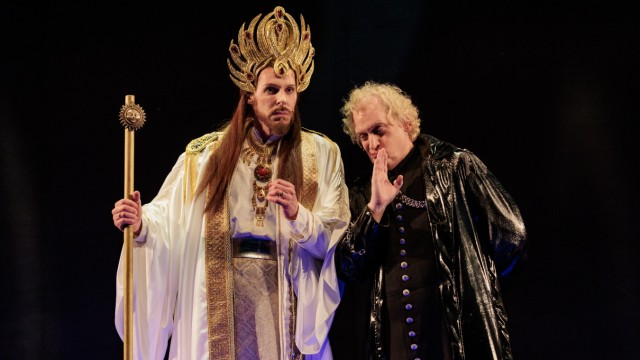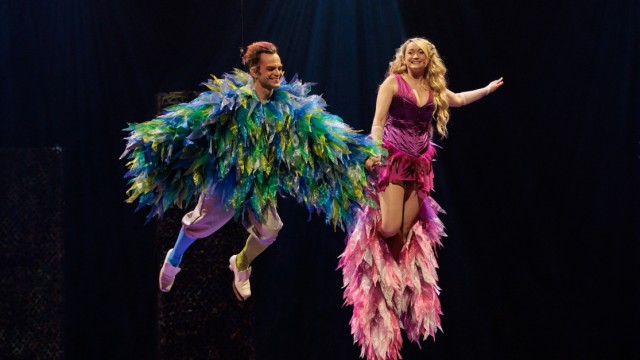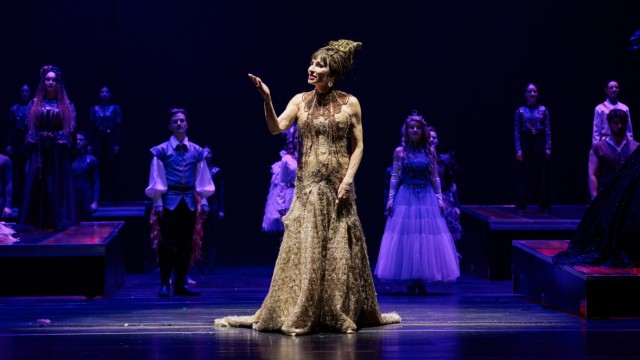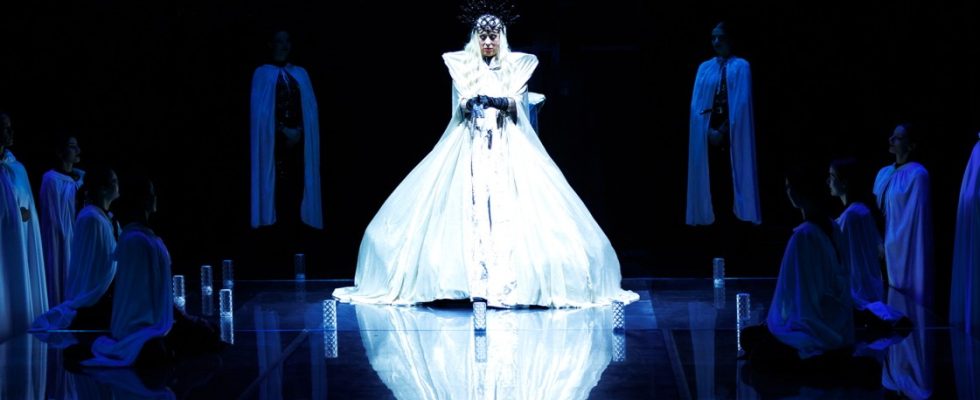We will probably never know how the inhabitants of distant galaxies react to Mozart’s “Queen of the Night” when they play the Golden Record with the greeting of humanity. The sound carrier left Earth in August 1977 on board the “Voyager 2” space probe and has now also left our solar system. Edda Moser’s infamous high Fs are immortalized on the data disk. The flaming angry tones come from a “Magic Flute” recording from 1972 with the Bavarian State Opera Orchestra under the direction of Wolfgang Sawallisch. Seen in this way, the cosmos should now also know that the earthlings in Munich make really good music. Space mission accomplished.
Which is why the height of the fall could be galactically high when “hell’s vengeance” once again boils in the queen’s heart at the preview of the world premiere of the musical “Magic Flute” on April 11th at the Deutsches Theater. For advocates of historically informed performance practice, the prospect of this Mozart variation may seem about as bleak as a black hole in space. But the musical fans can’t wait for the engines to fire up on Schwanthalerstrasse.
Ok, that’s enough metaphors from the NASA kitchen. One more thing: In the control center of this musical project there is someone who may not have a Golden Record hanging at home, but who does have a Golden Europe (ARD television award) and many, many other awards. And Frank Nimsgern is historically informed when it comes to the world of opera. “Nimsgern”, the name should immediately ring a bell for opera aficionados. His father Siegmund Nimsgern was a bass-baritone on stages around the world; La Scala in Milan, Royal Opera House London, Metropolitan Opera New York, in Bayreuth’s Solti-Ring, “Walküre”, he sang Wotan in 1983.
Whether Sir Georg Solti or Herbert von Karajan, Nimsgern Junior, born in 1969, has personally experienced many classical music deities. As a child he took piano lessons, later he studied composition at the Salzburg Mozarteum, but started his career very young as a famous guitarist and session musician for international stars such as Chaka Khan and Gino Vanelli, and wrote the music for Siegfried’s Daily Show & Roy in Las Vegas, also for film and advertising. Today Nimsgern is one of the most renowned composers in musical theater with productions such as “Qi”, “SnoWhite”, “Elements”, “Hexen”, “Hansel and Gretel”, “Poe”, “Der Ring” and “Jack the Ripper” . Someone with his experience knows exactly what he is doing or what it is best to stay away from.
Which is why he initially declined when Benjamin Sahler, head of the Neuschwanstein Festival Hall in Füssen and a trained opera director, came around the corner with the “Magic Flute” idea. As he now revealed in a backstage talk in the Silver Hall of the Deutsches Theater, Sahler was looking for beautiful, fairytale-like optimistic material in times of crisis, after a lot of deaths had recently occurred on his stage in the Allgäu, in “Ludwig II.” , “Zeppelin”, or the “Popeess”. But Nimsgern, with whom he had already forged the Nibelungen musical “Der Ring” in 2018, was more than skeptical: “I actually didn’t want to do it.” Because for him Mozart was “sacred”, brilliant music that couldn’t be improved upon. But then he holed up in his studio to “try out” the Queen of the Night’s revenge aria. The result was so exciting that he had the self-confidence to sign the contract with Sahler.
The composer on the guitar: Frank Nimsgern with Aino Laos as Queen of the Night at the presentation of the annual program in the German Theater.
(Photo: B. Lindenthaler/IMAGO)
In the musical, this is probably the most famous coloratura aria in opera history, as a kind of bow, the only piece in which you can recognize 1:1 Mozart’s score and the text of his librettist Emanuel Schikaneder. In the CD version, which you can already download from the relevant streaming services, Revenge of the Queen boils with guitar bombast, and singer Aino Laos sounds a lot like metal queen Doro Pesch, symphonic boosted. Otherwise, the makers said: Inhale Mozart, but reinterpret it instead of copying it. Nimsgern and his copywriter Laos have given each Magic Flute character, whether Tamino, Pamina, Papageno, Papagena, Sarastro or Monostatos, a new home stylistically. With recognition effect, “Wotan’s son” Nimsgern ultimately had a great teacher: “Leitmotiv” expert Richard Wagner.
How does that sound live? At least not like powdered baroque wig music à la “Rondo Veneziano”. There were impressions of the 34 songs in the Silver Hall of the Deutsches Theater and especially at the four test previews for audiences in the Füssen Festival Hall. And the music that will come from the tape in the performances. With Nimsgern’s extremely complex orchestration with 50 instruments, this simply cannot be achieved live. For this purpose, the composer himself will give the choir the performances at the premieres, and of course his soloists.

The whisperer: Chris Murray (right) as Monostatos with his boss Sarastro (Christian Schöne).
(Photo: Michael Böhmländer)
Papagno Tim Wilhelm is always funny here too, heissa hopsasa, a weird buffo bird, even more crazy than Mozart. He is allowed to stomp his feet to Irish folk fiddle, occasionally with tiny trace elements of the famous piccolo flute playing. How Nimsgern hidden the Mozart hits like a cameo in his compositions. Tamino (Patrick Stanke) doesn’t get a “portrait aria”, but rather languid pop. Monostatos is played by Chris Murray, a trained opera singer who has sung pretty much everything in musicals, from Jesus in “Jesus Christ Superstar” to Ché Guevara in “Evita” to Dracula. Here he is almost as frightening as the Queen of the Night in the song “Rache ist Süß”, the guitar-heavy rock sound of the eighties sends greetings, with a sweet symphonic score. Papagena (Stefanie Gröning) swings not at all innocently as “Dirty Birdie”. In the saddest G minor and mercilessly high, Pamina’s “Oh, I feel it” aria is in Mozart. Nimsgern wrote a ballad for his Pamina Misha Kovar that Helene Fischer could put on her “Could I cover” list.

Can fly of course: The bird dealer couple Papageno and Papagena (Tim Wilhelm and Stefanie Gröning).
(Photo: Michael Böhmländer)
As a child, composer Nimsgern says in the Silver Hall, he came out of his first Magic Flute at a loss. What is this classical hit parade actually about? Since the premiere in Vienna in 1791, two months before Mozart’s death, many people, especially directors, have struggled with this question. Singing play, children’s opera, educational play, Masonic play, theater parable? The piece has remained a mystery that defies interpretation. In their musical, Frank Nimsgern and Benjamin Sahler also want to tell the story of Prince Tamino, who is sent by the Queen of the Night to save her daughter Pamina from Sarastro, in a new and more compelling way. The outdated role models of the original are questioned – and the conclusion, as the two have already revealed, is heading towards reconciliation. “Mozart was, after all, a humanist,” says Nimsgern.

If someone can’t see through it anymore: musical star Anna-Maria Kaufmann will guide you through the evening as an oracle.
(Photo: Michael Böhmländer)
So that the audience can follow the whole thing, the oracle (Anna Maria Kaufmann!) is at their side as a guide. According to Benjamin Sahler, the visitor surveys after the previews in Füssen showed that a few gags still needed to be worked on, that fine-tuning was necessary here and there, and that Frank Nimsgern had composed a few more songs. Even in 1791, so the legend goes, Mozart and Schikaneder tinkered with “The Magic Flute” until shortly before the premiere curtain call.
A song in the musical is called “Sacrilege.” Nimsgern and Sahler know very well that opera purists become upset when someone tampers with their Mozart. You have already received angry letters. They are by no means the first, there is the “Magic Flute”, reloaded, as a hip-hop opera, as a fantasy film, as a puppet theater, as a production in a Berlin ghost train station, where Tamino sings: “I smoke a joint and drink beer, Live modestly from Hartz IV!” Maybe one or two Mozart connoisseurs will sneak into the Munich musical premiere. Guilty pleasures, secret pleasures, we all know, are the most beautiful.
Magic Flute, the Musical, preview: Thursday, April 11th, premiere: Friday, April 12th, 7:30 p.m., until April 21st, Deutsches Theater München, information and tickets at www.deutsches-theater.de

